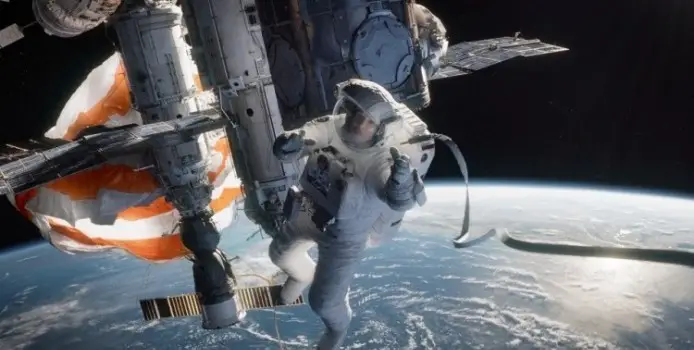GRAVITY: Revisited

Based in the UK and currently embarking on postgraduate research…
As this year’s Oscars draw ever closer, one was drawn to re-watching the awards contenders from last year. Some still stand up: Steve McQueen’s 12 Years a Slave is ever bit as wonderful as when I first saw it. However, while that was the film that deservedly took home Best Picture it was another that garnered the most acclaim, including Best Director for Alfonso Cuarón.
Said film was a box-office smash and a critical darling, with an aggregate review score that ranks among the highest given to any film in the twenty-first century. It wowed audiences all over the world and was hailed as a landmark blend of art and big-screen entertainment. However, upon revisitation, it is a film that showcases a number of alarming flaws that add up to pose a surprisingly significant problem. The film, of course, is Gravity.
Brilliant…or big-scale balderdash?
For those who are unaware, Gravity focuses on Dr. Ryan Stone (Sandra Bullock), a biomedical engineer who is thrust into a terrifying life-or-death battle in the vast emptiness of darkest space after a colossal satellite crash. What follows is her struggle for survival against increasing odds and the dual threat of emotional and physical isolation. In terms of the plot, that is virtually all you can say. When seen on the big screen however, this thinnest of narratives is not noticed.
Thanks both to Cuarón’s direction, its incredible sound and the beautiful cinematography of Emmanuel Lubezki, Gravity is a visually resplendent and arresting cinematic roller coaster. There are moments that leave you genuinely open-mouthed due to their sheer sense of awe. The impact of this silver-screen spectacle is profound and irresistibly positive, as my original review can testify to.

However, what is astonishing is just how easily doubts begin creeping into your mind when re-watching this supposed masterpiece on DVD or Blu-Ray in the comfort of your own home. The aesthetic quality is still undeniable, and there can be little discrediting of the the performances, particular that of Bullock. However, there are plenty of factors that niggle away in the back of the mind to the extent that they push themselves right to the fore.
You start to see the thinness of that plot you missed whilst drinking in its previous, sense-enveloping size. There are other things too: the clunky dialogue, the staggering plot conveniences (her lucky, heat-of-the-moment ability to guess-read Mandarin) and scientific inaccuracies that utterly undercut any sense of the film’s tension or pre-release claims of exhaustive research. No, he would not just floated off…he just would not have…
Defenders of this film will (perhaps rightly) be appalled at these pithy critiques, particularly the last point. The line goes “it’s called science-fiction, not science fact!”. Perhaps that’s true. I never watch The Empire Strikes Back screaming at how the Force is not a real physical force. However, the repost to this defence is twofold. Firstly, these were errors that were so easily avoidable – a film that claimed such exhaustive preparation should not be dropping the ball of spectacularly. This is particularly frustrating when you see that these clangers have been committed in the name of convenient plot developments; a lazy double-standard approach to film-making that promotes painstaking ‘truth’…so long as said truth doesn’t make the plot too tricky to play out.

Secondly, and most importantly in relation to this article’s point, the real problem is just how noticeable and off-putting these flaws are when you re-watch this film on a smaller screen. Away from the multiplex, the emperor has no clothes, and what is really underneath is far from pretty.
The Deceitful Magic of the Big Screen
Is Gravity truly a bad film? No, I don’t think so. It is too stunning to ever be truly awful, but it is surprising just how quickly and how easily its surface splendour fell away on later, smaller-scale inspection. What is more conclusive is just how poorly this film – much like James Cameron’s equally-groundbreaking cinematic spectacle Avatar – translates when moved from the silver screen. Some may see this as a defence of the cinematic art and by extension the film as a whole. The very fact that it does not work on a television screen is a testament to its integrity as a piece of ‘pure cinema’; something that only truly works when the lights dim in the biggest of screening rooms.

Such a defence would be well-intended, but wide of the mark. Of course many films look better on the big screen as that is where they were originally meant to live. But, a truly brilliant piece of grand scale cinema still manages to enchant and enthrall regardless of time, place or (crucially) screen size. The visual and atmospheric splendor of something like Lawrence of Arabia or 2001: A Space Odyssey manages to cross the divide between the cinema screen and the television screen because it has the soul to match the spectacle.
Gravity, for all its technical wizardry, lacks this most crucial form of magic. In its case, as with Avatar, the magic is only truly on the surface. It is indeed a roller coaster: an experience that only works on a vast, physical scale. You get on and it takes you round and you love it the second you step off. But, if you tried re-watching in your living room, you lose the very thing that made it so successful. Gravity will probably continue to live long and fondly in the memory as a grand piece of big-screen glory, but that is exactly the problem…it was only grand on the grandest of stages.
What do you think of Gravity? What other films let you down second time around? Can a film truly be a classic if it cannot work away from the big screen?
Comment below with your suggestions – we would love to hear them!
(top image source: Warner Bros. Pictures)
Does content like this matter to you?
Become a Member and support film journalism. Unlock access to all of Film Inquiry`s great articles. Join a community of like-minded readers who are passionate about cinema - get access to our private members Network, give back to independent filmmakers, and more.
Based in the UK and currently embarking on postgraduate research in Sheffield, Christopher has been writing prolifically about film for as long as it has taken him to alienate many old friends. Having previously written an award-winning column for a student newspaper, he is delighted to be a part of the excellent Film Inquiry team. He may love and analyse Inception a little too much, but he does have a broad appreciation of most things cinematic.













